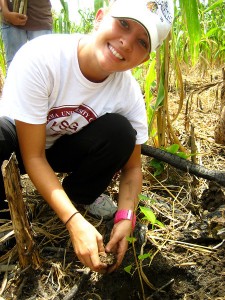Global Brigades Supplemental Programming – Small Contributions; HUGE Impact!
-
The “supplementary programs” strengthen sustainability and deepen community impact
between brigades. Each Program Lead is responsible for working with community members, local technicians, and committees of campus chair people (student leaders) to develop these programs. At the end of the year, Global Brigades distributes any remaining funds to implement them. As a social enterprise, remaining funds are directly tied to number of volunteers, but this year we are offering donors the opportunity to contribute directly into these programs to ensure that they continue regardless of volunteer volume.
100% of your donation will go directly to implement these programs without a single dollar spent on administrative costs, which are already covered through brigade operations. This is an opportunity to provide direct contributions into the community we serve, creating huge impact for families that live on just a few dollars a day.
Below is a description of the supplementary program for Environmental Brigades. To see the other programs, click on the program name here: Architecture, Business, Dental, Law, Medical, Microfinance, Public Health, Water.
Environmental Brigades – Community Waste Collection Center
For the 160 households in Piriatí Emberá, the primary method of waste management is burning or dumping into rivers. The burning and dumping of waste by these methods are hazardous not only to respiratory health but also environmental health. The only recycling which exists in the community comes in the form of a truck that drives by the community about once a month to collect scrap metals and car batteries only.
Currently, the City Hall of Chepo is responsible for collecting waste in the region, but it only collects within the capital of the district. Smaller communities in the region such as Piriatí Emberá do not get the service because the city hall does not have the physical resources (trucks, staff, etc.) or the operational budget to reach communities that are far away from the center. The City of Chepo has the largest population of the region and it is not economically feasible for the authorities to regularly collect waste in less-populated communities.
To address the needs of the community, Environmental Brigades would like to do the following:
•To build a community recycling center
•Collect recyclable wastes such as paper, aluminum, and glass
•Collect and compost organic wastes such as food scraps
•Create a small-scale business opportunity by generating profit from compost and recyclables
•Ensure capacity building for the community
•To promote the concept of the 3R principle (Reduce, Reuse, Recycle)
Project Sustainability
The collection system will be sustained through the charging of a small rate per household. The amount shall be determined by the community members’ willingness to pay as the Environmental Brigades team implements the household survey and explains to them the benefits and details of the project. For reference, the amount that has been charged in another community of similar size and waste management status as Piriatí Emberá is $0.25 per household per month. Of course, this value can be adjusted in the future as necessary to best suit community responses. The usage fee should be scaled in proportion to need. For example, small storeowners in Piriatí Emberá will be required to pay at least double the standard fee. Large families which produce more wastes can also be charged more than the baseline fee. Based on results from the household surveys, it will be possible to determine the appropriate fees.
The duties of the maintenance positions will include the collection, separation, and disposal of all waste products. There will be two paid positions to carry these responsibilities, and they will perform these duties one or two days per week. With the amount of houses in Piriatí Emberá, there is enough monetary potential to maintain a solid fund to pay for ongoing maintenance positions. This fund will also cover any recurring costs including maintenance materials as well as training activities for future leaders. The newly-formed Environmental Youth Committee (EYC) will be responsible for financial reporting and accountability. For transparency and accountability, they will share the reports of income and expenses at monthly meetings with other EYC members and Global Brigades so that everyone can have the chance to provide constructive feedback and/or necessary guidance.
Project Goals
To make this project a reality, our goal is to have $25,000 at the end of the year to invest in an Advanced Collection Center, providing:
•Offices and Classrooms for meeting and trainings
•Secured Landfill
•Items from Intermediate & Basic Collection Centers
Monitoring Plan
•Have EYC hold monthly meetings to evaluate the process, and to encourage constructive feedback •Implement regular weighing of the recyclable, both organic wastes and inorganic, to determine if the amount of diverted waste is increasing over time. One of the paid workers of the waste management system can measure and record these numbers which will be updated to a plot. The period between weighing can be matched to the frequency of which the recyclables are mixed into the compost pile or transported to the recycling facility
Project Outcomes and Indicators
•The visual improvement of households, communal areas, streets, and the school from having less waste laying around and/or piling up
•Environmental Youth Committee’s ability to inform and mobilize community members
•Community members’ participation level with the design and implementation of the project
•The monetary return on selling recyclable materials and composts
•The weighed amounts of diverted wastes, and subsequently, the possibility to track and even plot the progress on a graph
•The number of households participating in the waste collection and recycling program, and further down, the number of households and/or community members they teach these new waste management concepts




